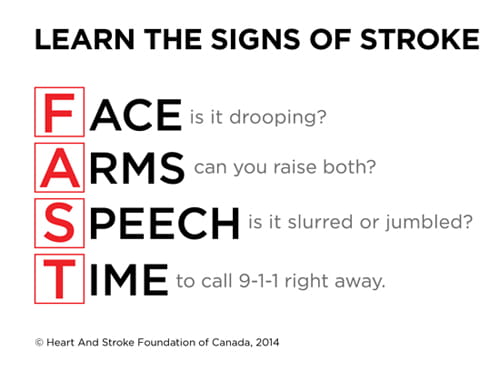Released on January 16, 2017
With today’s formal launch of the Saskatchewan Acute Stroke Pathway, patients showing signs of a stroke will benefit from standardized care during the first few hours after the onset of symptoms, which can significantly improve outcomes for many patients.
The pathway establishes consistent protocols for rapid, coordinated, high-quality care of stroke patients across the province, ensuring that best practice care is available from ambulance to emergency room to hospital admission.
“People who display symptoms of stroke, no matter where they live in Saskatchewan, now have access to more timely and appropriate care during the first crucial hours following a stroke,” MLA Gene Makowsky said on behalf of Health Minister Jim Reiter. “Through the Acute Stroke Pathway, health care teams are working together to identify, evaluate and treat patients as quickly as possible.”

“When dealing with stroke, we’re working against the clock,” Saskatoon Health Region cerebrovascular surgeon Dr. Michael Kelly said. “By arriving at an accurate diagnosis quickly, we increase the chances of reducing or eliminating the sometimes debilitating damage a stroke can cause.”
Since 2013, Dr. Kelly and a team of stroke experts have worked with health system partners to align local procedures with national standards for hyperacute stroke care. Physicians and health region staff were instrumental in the adoption of the Acute Stroke Pathway protocols, so more patients can receive early assessment and access to life-changing acute stroke treatment.
Pathway-based hyperacute stroke care is offered in seven primary stroke centres across the province and two tertiary stroke centres in Regina and Saskatoon.
Dr. Kelly holds a Saskatchewan Research Chair in Clinical Stroke Research, with primary funding by the Heart & Stroke Foundation and the provincially-funded Saskatchewan Health Research Foundation. This research chair contributes to a number of improvements in stroke care provincially, nationally and internationally.
“We are pleased that this pathway allows provincial implementation of guidelines based on the Heart & Stroke Foundation’s best-practice recommendations for hyperacute stroke care, and that Dr. Kelly’s role as research chair supported the adoption of the pathway,” Heart & Stroke Saskatchewan CEO Allison Kesler said.
In 2015-16, 1,751 people in Saskatchewan were hospitalized for stroke. About half of all stroke patients experience some permanent or long-term disability.
For more information about the pathway, visit www.sasksurgery.ca/patient/acutestroke.html
-30-
For more information, contact:
Tyler McMurchy
Health
Regina
Phone: 306-787-4083
Email: tyler.mcmurchy@health.gov.sk.ca
Cell: 306-537-3594
Lisa Thomson
Media Relations Consultant
Reqina Qu'Appelle Health Region
Phone: 306-766-5332
Email: lisa.thomson@rqhealth.ca

